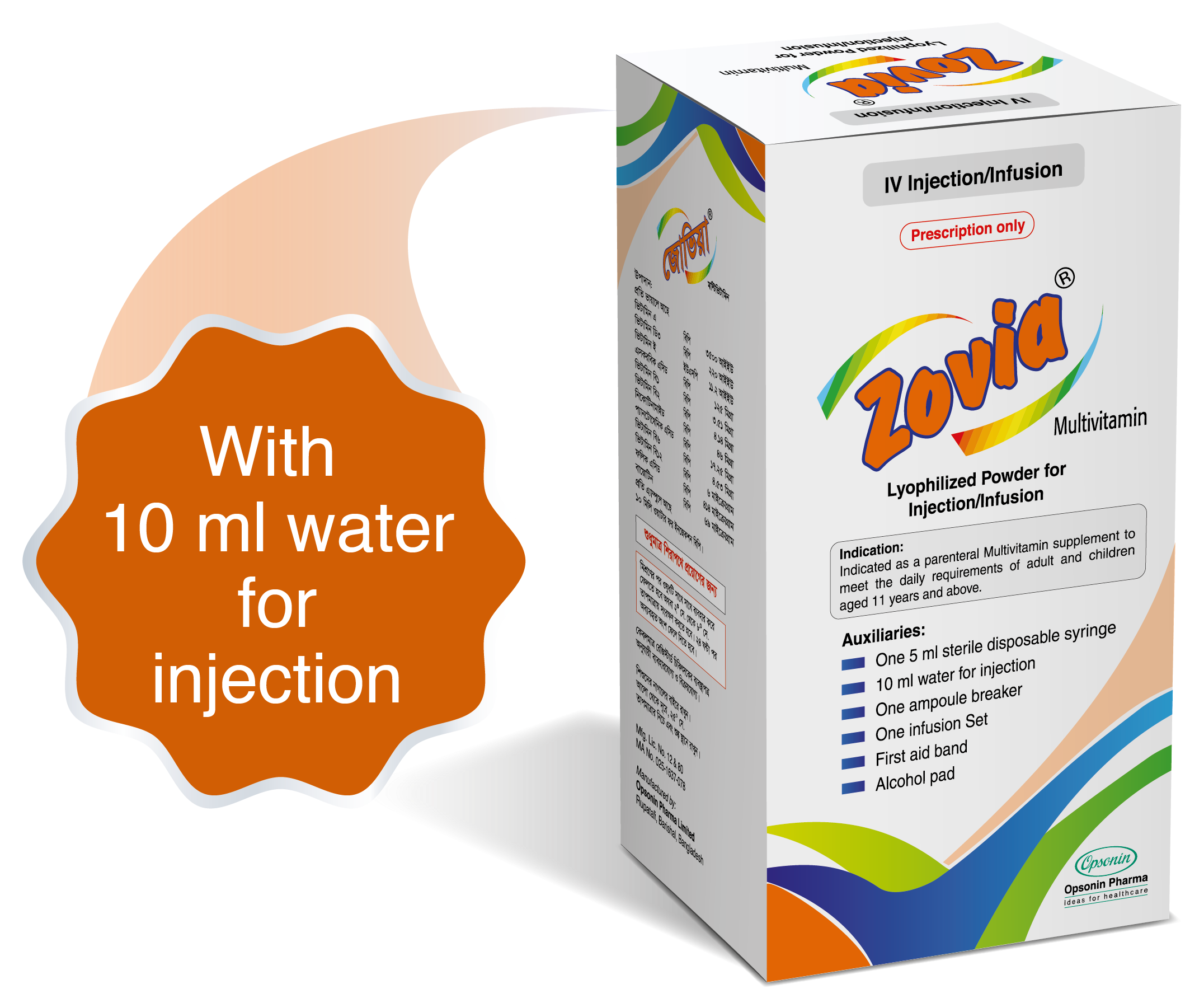Indications
This is indicated as a daily Zovia maintenance dosage for adults and children aged 11 years and above receiving parenteral nutrition. It is also indicated in other situations where administration by the intravenous route is required. Such situations include surgery, extensive burns, fractures and other trauma, severe infectious diseases and comatose states, which may provoke a "stress" situation with profound alterations in the body's metabolic demands and consequent tissue depletion of nutrients.
* রেজিস্টার্ড চিকিৎসকের পরামর্শ মোতাবেক ঔষধ সেবন করুন
Composition
This is a lyophilized, sterile powder for injection/infusion which contains both water soluble and fat soluble vitamins. Each vial contains:
- Vitamin A BP 3500 IU
- Vitamin D3 BP 220 IU
- Vitamin E USP 11.2 IU
- Ascorbic Acid BP 125 mg
- Vitamin B1 BP 3.51 mg
- Vitamin B2 BP 4.14 mg
- Nicotinamide BP 46 mg
- Pantothenic Acid BP 17.25 mg
- Vitamin B6 BP 4.53 mg
- Vitamin B12 BP 6 mcg
- Folic Acid BP 414 mcg
- Biotin BP 69 mcg
Description
This is a sterile, lyophilized powder for injection/infusion which contains nine water-soluble and three fat soluble vitamins. Mixed micelles is used as a solubilizing agent. It is presented as a lyophilized, sterile powder that is to be reconstituted with 5ml of Water for injections or other parenteral fluids (e.g. as 0.9% Sodium chloride or 5% Glucose solution), prior to administration by parenteral route.
Dosage & Administration
Adults and children aged 11 years and above: 1 vial/day. The single dose vial is reconstituted by adding 5 ml of sterile Water for injection or other intravenous fluids like 0.9% Sodium Chloride injection or 5% Glucose injection. 5 ml of diluent should be added by means of sterile syringe into the vial and gently mixed to dissolve the lyophilized powder. The entire volume of the resultant solution should then be administered by slow Intravenous injection (at least over 10 minutes) or further diluted for intravenous infusion. To minimize vitamin losses in parenteral nutrition admixtures, add the vitamins immediately prior to administration and complete administration within 24 hours.
* রেজিস্টার্ড চিকিৎসকের পরামর্শ মোতাবেক ঔষধ সেবন করুন
Interaction
Patients receiving drugs that bind to a1-acid glycoprotein should be closely monitored for increases in response to these drugs, e.g. propranolol, prazosin and quinidine. Folic acid may increase the metabolism of some antiepileptics, such as phenobarbital, phenytoin and primidone. Pyridoxine can reduce the effect of levodopa. Bleomycin can be inactivated by ascorbic acid and riboflavin.
Contraindications
This is contraindicated in patients with pre-existing hypervitaminosis or known hypersensitivity to any of the active ingredients. This product should not be injected to patients with pre-existing intolerance to thiamine. Similarly, this product should not be administered to patients with impaired hepatic function. This preparation should not be administered to those suffering from hyperparathyroidism due to hypercalcaemic complications.
Side Effects
Anaphylactic reactions have been reported following large intravenous doses of Thiamine. Urticaria and
rash have also been associated with Zovia. There have been very rare reports of anaphylactic reactions following IV injection/infusion with Zovia over 1-4 minutes.
rash have also been associated with Zovia. There have been very rare reports of anaphylactic reactions following IV injection/infusion with Zovia over 1-4 minutes.
Pregnancy & Lactation
The use of this preparation has not been studied in human during pregnancy. This should be given to a pregnant woman only if clearly needed. The use of this product in lactating women is not recommended.
Precautions & Warnings
Anaphylactic reactions may occur in allergic subjects who are susceptible to Thiamine (Vitamin B1) and nicotinamide components of Zovia. Mild allergic reactions such as sneezing or mild asthma are warning signs that further injection/infusion may give rise to anaphylactic shock. Due to glychocolic acid content, repeated and prolonged administration in patients with jaundice of hepatic origin or severe biochemical evidence of cholestatis requires careful monitoring of liver function. Also in the case of impaired kidney function, fat-soluble vitamin levels should be carefully monitored.
Storage Conditions
Before reconstitution: Store below 25°C. Protect from light and do not freeze. After reconstitution: The reconstituted product should be used immediately or it should be stored at 2°C to 8°C for not more than 24 hours. Discard any unused portion of the reconstituted solution.

